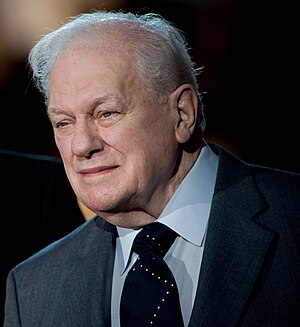~Graphic by "The Social Butterfly"
In addition to all the destructive consequences that may follow traumatic experience, some people say it also has power to encourage creative expression.
 The photo is of the late actor Charles Durning (1923–2012) who reportedly appeared in over 200 movies, television shows and plays.
The photo is of the late actor Charles Durning (1923–2012) who reportedly appeared in over 200 movies, television shows and plays.
In World War II, he was severely wounded by shrapnel, and also engaged a very young German soldier in hand-to-hand combat.
After killing the boy, Durning said in an article, he “held him in his arms and wept. He said the memories never left him, even when performing, even when he became, however briefly, someone else.”
Can this kind of trauma, which often leads to PTSD, have any positive impact on creative imagination and expression?
In her provocatively titled post Does Trauma Increase Creativity?, Laura K Kerr reports on a study that, she notes, “suggests there may be a connection between creativity and posttraumatic stress disorder (PTSD).
“Research conducted by Robert Miller and David Johnson revealed PTSD correlates with a greater capacity for symbolic representation, which is necessary for artistic as well as scientific endeavors.”
She explains, “The study compared 56 Vietnam combat veterans with 14 veterans who lacked combat exposure. Originally, Miller and Johnson thought their research would show PTSD diminished a person’s competence with manipulating symbolic material.
When participants of the study were asked to portray and act out an imaginal scene, the researchers said, “The PTSD group when compared to the non-PTSD group were better able to represent the boundary between reality and the role-playing, to immerse themselves in the scene, to enact identifiable characters consistent with their setting, and produce complex and interactive scenes that told a coherent story.”
Kerr adds,
“Given that PTSD is also characterized by flashbacks, nightmares, and intrusive imagery—all symbolic representations of actual events—the results of the study seem supported by what is known about the experience of PTSD: it increases the psyche’s likelihood of generating and interacting with symbolic representations.”
In another post, she writes,
“Trauma births its own world, one that exists beside the regular, expressed order of things where life stories are normalized, validated, even valorized. In trauma’s otherworldly realm—the imaginal landscape of our minds—travel the fragmented narratives of what transpired, but also of what failed to come about: escape from harm, facing down abusers, regaining a sense of safety.
“Here we find the birthplace of grief, but also creativity, the origins of trauma stories, yet also their erasure, all vying for connection with what can no longer be—or become—now that trauma has claimed its space.”
From post: Trauma’s Imaginal Worlds.
Laura K Kerr, PhD, is a Mental Health Scholar and psychotherapist with interests in trauma studies and depth psychology.
Durning also commented that acting helped release at least some of the horror he suffered. He is quoted in a New York Times article: “There are many secrets in us, in the depths of our souls, that we don’t want anyone to know about. There’s terror and repulsion in us, the terrible spot that we don’t talk about. That place that no one knows about — horrifying things we keep secret.
“A lot of that (horror) is released through acting.”
From my article Creative People and Trauma.
Actor Meg Ryan has expressed a perspective that many creative people probably share:
“I don’t think you want to cultivate dramatic and traumatic experiences in your life in order to be an artist. I think that’s all wrong. But you can use them… there’s a redemptive power in your life when you go through hardships.”
[Los Angeles Times, Oct 5, 2003. Also quoted in my book "The Creative Mind: Identity and Confidence."]
~Graphic by "Death of a Loved One"

Picture: Broken: thanks to ~Jill Compton who shared Words of Wisdom's photo
Article: http://blogs.psychcentral.com/creative-mind/2013/01/can-trauma-enhance-creativity/
















































No comments:
Post a Comment